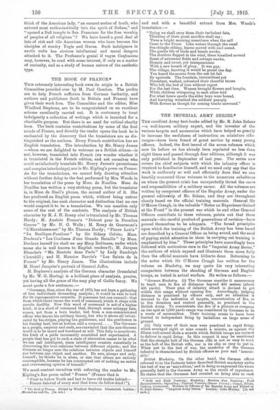THE BOOK OF FRANCE.*
THIS extremely interesting book owes its origin to a British Committee presided over by M. Paul Cambon. The profits
are to help French sufferers from German barbarity, and authors and publishers (both in Britain and France) have
given their work free. The Committee and the editor, Miss -Winifred Stephens, are to he congratulated on an excellent scheme excellently carried out. It is customary to treat indulgently a collection of writings which is launched for a
charitable purpose. But there is no need for critical charity here. The book contains contributions by some of the first minds of France, and directly the reader opens the book be is enchanted by the discovery that the translators are as dis- tinguished as the authors. Every French contribution has an English translation. The introduction by Mr.. Henry James —whom we are delighted to welcome as a British citizen—is not, however, translated into French (we wonder whether it is translated in the French edition, and ask ourselves who could satisfactorily translate Mr. Henry James's parentheses and complex interlacings),nor is Mr. Kipling's poem on France. As for the translations, we cannot help drawing attention without further delay to the feat performed by Mrs. Woods in her translation of the poem by Mme. de Noailles. Mme. de Noailles has written a very striking poem, but the translator is, in Mme. de Staol's phrase, the second author of it. She has produced an English poem which, without being untrue
to the original, has such character and distinction that no one would suspect it to be a translation. We can mention only
some of the rest of the contents. The analysis of British character by M. J. H. Rosny (ino is translated by Mr. Thomas Hardy ; M. Anatole France's "Dabout pour In Dernibre Guerra " by Mr. H. G. Wells ; M. Remy de Gourmont's "L'Envahissement" by Mr. Thomas Hardy ; "Pierre Loti's" "La Basilique-Pantome " by Sir Sidney Colvin; Mme.
Duclaux's "Les Coulisses 'Tune Grande Bataille" by Mme. Duclaux herself (or shall we say Mary Robinson, under which name she is well known to English readers ?); M. Jacques Blanche's "Ma Rentree dans Paris" by Lady Randolph
Churchill ; and M. Maurice Barren's "Les Saints de la France" by Mr. Henry James, The illustrations include M. Henri Jacquier's portrait of General Joffre.
M. Boylesve's analysis of the German character (translated by Mr. W. G. Hartog) is a brilliant piece of analysis, precise, yet having all the grace of the easy play of Gallic fancy. We must quote a few sentences :—
" Germany, then, since the war of 1870, has not been a gathering of free individuals demanding analysis ; it would bo vain to look for its representative summits. It possesses but one summit : that from which there issues the word of command, which it obeys with servile docility. Now this word of command is not of a higher kind; it is a word of command that, through some unhappy fate, comes, not from a born leader, but from a non-commissioned officer who knows his military theory, but who is above all intoxi- cated by his stripes, playing the gentleman, and the gentleman in his Sunday best, but at bottom still a corporal. . . . The Germans as a people, emperor and serfs, are convinced that the non-German world is to be taxed and burdened at will. This folly is monstrous, the fruit of a pride incessantly nourished and superheated. A people that has got to such a state of aberration ceases to be what
we can call intelligent, since intelligence consists essentially in discovering the true relations between different objects ; and the
German no longer sees the relations between objects and himself nor between one object and another, He sees, always and only, himself ; he thinks he is alone, or else that others are entirely contemptible, because he has constructed out of nothing an entire and overweening opinion of himself."
We must content ourselves with referring the reader to Mr.
Kipling's fine poem called "France" (France that is
" First to follow Truth and last to leave old truths behind— France beloved of every soul that loves its follow-kindl"),
*
The Boole of France. Edited by Winifred Stephens. Illustrated. London _Ildacmillau and Co. [50. net.)
and end with a beautiful extract from Mrs. Woods's translation :-
"Dying we shall envy them their turbulent fate,
Thinking of their great sacrifice shall say : 'Twas a bright morning sometimes when the call
Came to the Front. Like waters through the small
Sea-shingle ebbing, leaves moved with cod sound.
The gentle life of birds and beasts awoke, The shutters flapped in the wind, there breathed around Scent of autumnal fields and cottage smoke, Homely and sweet, yet interpenetrate With a new breath of glory. It was gay,
The village, knowing it would be proud one day. You hoard the acorns from the oak let fall
By squirrels. The fountain, intermittent yet Persistent, washed, refreshed their cheerful brows Who left the bed of love without regret
For the last time. Women brought flowers and boughs,
While children whispering to each other told For what brave sports the elder boys were bound, And hurrying wreathed the soldiers' panoply
With flowers as though for coming tombs enwound,"


































 Previous page
Previous page